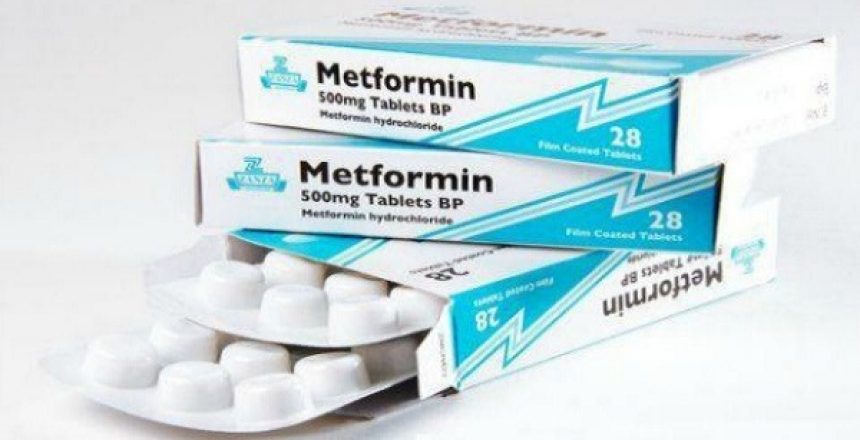The anti-diabetic drug metformin is widely touted as a drug that fights aging, which would be great if true. It’s cheap and appears to be very safe, it’s been prescribed for diabetes for decades and has been studied extensively. But is metformin really an anti-aging drug? There are some reasons for skepticism.
Metformin inhibits exercise adaptations
A study just published in Aging Cell reports that metformin blunts the benefits of exercise training: Metformin inhibits mitochondrial adaptations to aerobic exercise training in older adults.
Participants, average age 62, were randomized to either metformin or placebo, and undertook aerobic exercise training for 12 weeks.
In the metformin group, there was no overall change in whole‐body insulin sensitivity after AET due to positive and negative responders. Metformin also abrogated the exercise‐mediated increase in skeletal muscle mitochondrial respiration. The change in whole‐body insulin sensitivity was correlated to the change in mitochondrial respiration… The influence of metformin on AET‐induced improvements in physiological function was highly variable and associated with the effect of metformin on the mitochondria. These data suggest that prior to prescribing metformin to slow aging, additional studies are needed to understand the mechanisms that elicit positive and negative responses to metformin with and without exercise.
In some ways, this isn’t a surprise, since it’s already known one way in which metformin works is by inhibition of Complex 1 in mitochondria. (Ref) By inhibiting mitochondria, the powerhouses of the cell, less ATP is formed, which activates AMPK, an energy sensor. In turn, AMPK activates many processes that contribute to better metabolsim, including lower insulin and glucose and increased fat burning.
The blunting effect of metformin on exercise was not small either. Increase in VO2max in the metformin group was only about 50% that of the placebo group. The improvement in whole-body insulin sensitivity in the metformin group was zero, compared to a significant increase in the placebo group.
Some caveats: the metformin group took 2,000 mg daily, which is a full, anti-diabetic dose. All participants were not diabetic but had at least one risk factor for diabetes.
Since cardiorespiratory fitness is one of the strongest factors for survival into old age, and since it decreases with age, the effect of metformin on this factor is concerning.
So, what gives? Is metformin healthy and anti-aging, or not?
The relation between obesity and aging
Other studies have shown that metformin extends lifespan in lab animals (rodents), and has apparently healthy effects in humans. A clinical trial of metformin as an anti-aging drug is planned.
For example, Metformin improves healthspan and lifespan in mice. This paper’s authors include some highly regarded names in the study of aging, including David Sinclair, Rafael de Cabo, and Stephen Spindler.
The problem with this study is that the authors appear to believe that diet has no effect on the health of lab animals.
If you give animals lab chow, which has been aptly nicknamed “crap in a bag”, and you confine them to cages, they become unhealthy. That shouldn’t be a surprise, since they’re eating a highly unnatural diet of ultra-processed food, equivalent to eating pizza and drinking soda pop for every meal; the cages also ensure that they don’t get adequate physical activity.
Then there’s the psychological factor of being confined in a cage, away from a natural habitat.
Here’s the food that the scientists gave these mice, AIN-93G:

This stuff is basically sugar and seed oils, soybean oil, and a few vitamins and minerals.
Of course metformin is going to extend their lifespan.
Metformin helps diabetics too. That doesn’t mean it will help healthy people.
The scientists who performed this study seem blissfully unaware that feeding their animals garbage virtually invalidates the idea that metformin slows aging or extends lifespan.
Another study, this one with the also celebrated name of Vladimir Anisimov as the first author, found “If started early in life, metformin treatment increases life span and postpones tumors in female SHR mice“. The only mention of diet is “standard laboratory chow”, which means something similar to, if not identical with, the garbage food shown above.
In the wild, mice eat seeds, fruit, and insects, not lab chow. Metformin may not do a thing for mice in their natural habitat, and in any case, it hasn’t been tried.
The reason that scientists have been so quick to see metformin as an anti-aging drug is because (IMO) of the seemingly close relation between obesity and aging.
As people get older, they gain body fat, lose muscle, and develop insulin resistance. This is very similar to the effects of eating junk food and not exercising.
But is that aging, or is it something else.
Many humans living in natural environments, i.e. hunter-gatherers, do not gain fat with aging, or develop insulin resistance or hypertension. These health problems appear largely to be an artifact of living in the modern world.
In humans, the insulin resistance of aging is more closely associated with abdominal adiposity than with aging.(Ref.)
Likewise, lab animals also gain fat and develop insulin resistance as they age. See chart below. (Source.)

Lab rats are fully mature at 5 to 6 months of age, yet in labs they gain weight consistently with age. That seems highly unlikely in the wild.
Lab conditions make animals fat and sick.
Calorie restriction does not extend the lifespan of wild mice.
We see that there’s a strong resemblance between aging, or what we think of aging, to obesity and insulin resistance, but these may be merely the effects of the modern world.
if you give metformin to overweight, insulin resistant people and animals, it improves their health and increases their lifespan.
But does metformin do anything to improve the health and increase the lifespan of already healthy people? Would it enable Okinawan centenarians or Kitavans or humans doing calorie restriction to live longer? That seems doubtful to me.
One study looked at the difference between diabetics on metformin vs non-diabetics who did not take it: Can people with type 2 diabetes live longer than those without? A comparison of mortality in people initiated with metformin or sulphonylurea monotherapy and matched, non‐diabetic controls. It concluded:
Patients with type 2 diabetes initiated with metformin monotherapy had longer survival than did matched, non‐diabetic controls.
Case closed? No, not by a long shot. At least 88% of the population is metabolically unhealthy. In a group of people matched by age and other characteristics to diabetics, we could expect that they would be nearly 100% metabolically abnormal.
So the matched group could have benefited from metformin too. That does not show that metformin fights aging.
Key to longevity: insulin
The plausible connection of metformin to longer lifespan is due to its ability to lower insulin, which is crucial to long life and health.
Insulin represents a conserved evolutionary mechanism of aging. Keeping insulin low prolongs lifespan.
If your insulin is already low – and mine is – metformin very likely won’t lower it further. Plus, as we saw, metformin abrogates the benefits of exercise.
To see whether and how much diet matters to aging, lets look at a simple organism in which quality of diet may not make a lot of difference: yeast. They feed on sugar.
Enhancement of mitochondrial function correlates with the extension of lifespan by caloric restriction and caloric restriction mimetics in yeast. This study showed that calorie restriction and rapamycin extended the chronological lifespan of yeast, but metformin did not.
Since yeast do not become obese or insulin resistant, metformin doesn’t extend their lifespan.
If you are not obese or insulin resistant, then perhaps metformin will not extend your lifespan.
The main point
We saw in the first study that metformin blunts the benefits of exercise. Therefore metformin has risks as well as benefits. It is not cost-free.
The close relation between obesity and aging means that it’s difficult to separate the effects of one from the other.
If you are lean, have low fasting insulin, exercise regularly and have a high VO2max, and do not eat ultra-processed foods made of refined grains, sugar, and seed oils, then it appears that any benefit of metformin would be minimal to none. Yet metformin has downsides.
In my opinion, it’s far too early to conclude that metformin fights aging.
Metformin fights the ill effects of the modern age to be sure, and probably a very high percentage, >90%, of the older population might benefit from it.
But that’s because they’re overweight, out of shape, and eat junk food, not because they’re old.
If insulin resistance does increase to some extent solely because of aging, then perhaps only very old people would benefit from it.
The rest of us should exercise and live healthy lifestyles.
The science of aging, or anyway the scientists of aging, pay little attention to healthy lifestyles and right diet. They seem to believe that feeding their animals garbage and confining them to cages is sufficient to study the process of aging.
It isn’t. They’re only studying the modern conditions that make people ill.
Update:
On further research I found a study from 2010, “Metformin Supplementation and Life Span in Fischer-344 Rats“, of which the abstract states:
Calorie restriction (CR) has been known for more than 70 years to extend life span and delay disease in rodent models. Metformin administration in rodent disease models has been shown to delay cancer incidence and progression, reduce cardiovascular disease and extend life span. To more directly test the potential of metformin supplementation (300 mg/kg/day) as a CR mimetic, life-span studies were performed in Fischer-344 rats and compared with ad libitum feeding and CR (30%). The CR group had significantly reduced food intake and body weight throughout the study. Body weight was significantly reduced in the metformin group compared with control during the middle of the study, despite similar weekly food intake. Although CR significantly extended early life span (25th quantile), metformin supplementation did not significantly increase life span at any quantile (25th, 50th, 75th, or 90th), overall or maximum life span (p > .05) compared with control.
What’s different about this study? The diet they gave the rats was much better:

While this diet isn’t perfect by any means, it’s a lot better. It contains no sugar, lots of whole, fibrous grain – which mice would be expected to eat in the wild – and a slightly lower amount of seed oils. It contains no casein, which is milk protein, and mice are not likely to eat much of that in the wild either. Fish meal ensures some omega-3 fatty acids.
The study says that “the type of diet used in the current study (NTP-2000) was optimized for health and longevity benefits”.
The discussion sections contains a lengthy list of possible limitations to the study, such as too low of a dose, the particular rat strain used, and lack of a robust calorie restriction response. Nevertheless, metformin did not extend the lifespan of these rats, and that was even despite metformin-treated rats weighing less than controls at almost all time points in the experiment.
This study adds further evidence to the idea that metformin protects against a bad diet and unhealthy lifestyle, but doesn’t extend lifespan under healthy conditions.
By the way, this rodent diet contains 4 times the amount of iron necessary.










16 Comments
At the end of the day it’s about $$. There is little to gain from having a study of metabolically healthy ppl taking metformin and determining if it has anti-aging benefits.
Years ago I was excited about the thought of metformin being part of anti aging protocol. The latest research that I have read shows that metformin could increase chance of dementia in healthy older adults.
I take some supplements for their anti-aging benefits, but I would not take metformin, at least not until a lot more study is done on its benefits/drawbacks for healthy people (and those studies are not likely to be done anytime soon, as John says). There are studies out there that found that Vitamin B12 deficiency is very common among metformin users, which is disturbing:
https://www.ncbi.nlm.nih.gov/pubmed/21940283
Lots of other potential negative side effects also. No
thanks, I’ll pass on metformin.
P.D., what does this mean for the metaformin-like supplements, like Berberine?
Berberine has the same mechanism of action as metformin, so it’s likely that the same argument used above applies to it too.
Very interesting article. I had a little test drive with metformin, took 1000mg and increased to 2000mg a day for almost 3 weeks. My appetite went down, it felt like my stomach was fuller after meals and that my digestion was slower kind of how you feel after a heavy meal. Energy was lower when walking around and in the gym, which coincides with the lower VO2 max.
The fact that all these rats studies are made with the equivalent diet of very unhealthy people makes me look at most studies with more skepticism. Great info!
Thanks, Pieter. I’ve tried metformin too, might have made me less hungry. But I’ve only taken 500 mg at a time, and not daily. From the study on exercise and metformin, seems like one might get some benefit from metformin by taking it only sporadically and not on exercise days. There’s also evidence that metformin works in part by an effect on gut microbiota, and that seems like a low dose would work. Seems to me sporadic, low dose use might provide some benefits with little downside.
Do you still see Metformin as important for lowering Iron?
Mimicking iron deficiency could be a mechanism of metformin, but for lowering iron, other methods are probably better.
I hope it is OK to post links to youtubes.
After I read this thread I did some internet searching on youtube on anti-aging. I found this BBC program. At the 28:55 mark it mentioned Metformin as a drug that is being tested for anti-aging. I hadn’t searched for information on Metforman, it just came up.
https://www.youtube.com/watch?v=p_4UPdFqgIQ
Where I live Metforman is an OTC drug. Very little cost.
2000mg/day does not seem like a fair trial, like they are sabatoging the competition.
But the results are supportive of my hypothesis that mtor inhibitors; M, Rapamycin, CR, should be used on an intermittent basis.
OT. Dennis, have you looked into skin care for older men, and how to mitigate effects of aging?
Hi JP, I have a few solid leads. Skin photodamage is largely mediated by iron, so keeping that in the low normal range ought to help. Also, there’s fairly solid evidence for topical use of nicotinamide, creatine, and IP6, and there’s a commercial skin cream with nicotinamide (you can find that on my supplements page).
(off topic)
I recently heard of food poisoning statistics in Germany in local news.
A food chemist pointed out that there were no confirmed food poisonings all over the country in the last decades associated with (illegal) selling of rotten meat (“Gammelfleisch” in Germany) for human consumption – instead, all of the cases, including a few deadly ones, were associated with marine foodstuffs (like mussels, only few cases, as it’s eaten rarely) and – by far the largest number of cases – with plant foods, especially pre-cut salads, which seem to have a tendency to facilitate the growth of bacteria that really upset the human digestive and immune system and have even killed people, being the major cause of the absolute number of and the number of deadly food poisonings.
The meat legally considered as unhygienic and rotten was served to customers in millions of cases, who tolerated it just fine and liked the taste, evidenced by the fact that they came back for more.
In the light of the idea that humans evolved primarily by and for meat eating, I consider this interesting evidence.
For past millions of years, humans had no effective means of meat conservation, so after a big successful hunt, lots of meat would have been left in the open to somewhat rot, and then still get eaten.
The above food poisoning statistics suggest that humans have evolved to tolerate rotten meat as a food source very well, indicating that our physiology is even more adapted to meat-eating than commonly thought:
If even decayed (some call it “aging”) meat causes quite exactly zero harm, but salads are the foremost cause of deaths from food poisoning, this sends a clear message.
The best way to prevent premature aging and the problems associated with it is taking the right diet. e.g foods rich in vitamins and antioxidants such as leafy green vegetables nd organic fruits…
@Jimmy, thanks for the prosaic advice. Should I drink more water also?